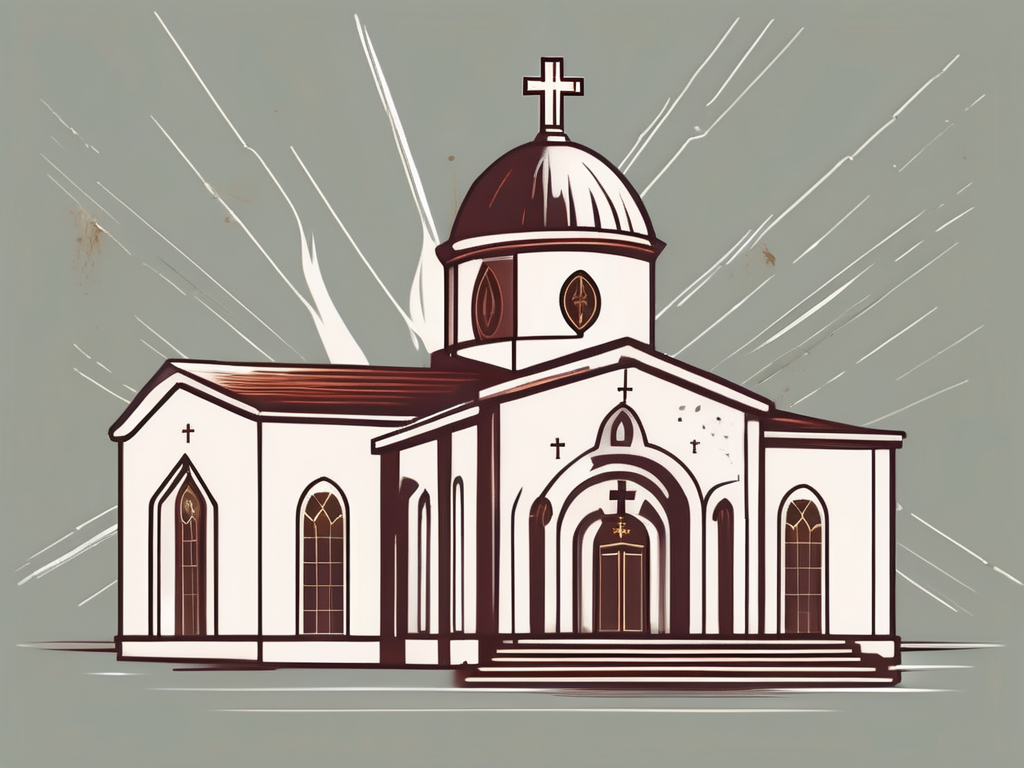Bartholomew the Apostle holds a significant place in the history of Christianity. His life and teachings have been an inspiration for believers around the world. In this article, we will delve into the early life, role in the Apostolic Age, travels and missionary work, martyrdom, and his lasting influence.
Early Life of Bartholomew the Apostle
Birth and Family Background
Little is known about the birth and family background of Bartholomew. According to tradition, he was born in Cana, Galilee, which is also the site where Jesus performed His first miracle. Cana, a small village known for its agricultural abundance and vibrant community, would have provided a nurturing environment for Bartholomew’s early years.
As for his family, it is believed that Bartholomew came from a devout Jewish heritage. His parents, whose names have been lost to history, were likely deeply committed to their faith and actively participated in the religious life of their community. They would have instilled in young Bartholomew a love for God and a reverence for the ancient traditions of Judaism.
Education and Early Influences
Bartholomew’s formative years were marked by solid education and exposure to various religious teachings. Growing up in a Jewish community, he would have received a robust religious education, becoming well-versed in the Scriptures and Jewish customs. The local synagogue, a central hub of learning and worship, would have played a significant role in shaping his understanding of God and His commandments.
However, it was his encounter with Jesus that would shape his life and lead him to become one of the twelve apostles. Like the other apostles, Bartholomew witnessed firsthand the miracles performed by Jesus, experienced His teachings, and developed a deep faith in Him. The powerful presence of Jesus, His compassion for the marginalized, and His unwavering commitment to truth and justice left an indelible mark on Bartholomew’s heart and mind.
As Bartholomew followed Jesus, he not only learned from His teachings but also observed His character and the way He interacted with people from all walks of life. The love and humility that radiated from Jesus inspired Bartholomew to emulate these qualities in his own life, becoming a beacon of hope and compassion to those he encountered.
Bartholomew’s journey with Jesus was not without challenges. He faced opposition from religious leaders who were threatened by Jesus’ message of love and redemption. Despite the risks, Bartholomew remained steadfast in his commitment to Jesus, willing to endure persecution for the sake of the Gospel.
Throughout his early years, Bartholomew’s faith continued to deepen as he witnessed the transformative power of Jesus’ ministry. His encounters with people who were healed, restored, and forgiven by Jesus fueled his own desire to share the good news with others. Bartholomew’s passion for spreading the message of salvation became a driving force in his life, leading him to play a vital role in the early spread of Christianity.
Bartholomew’s Role in the Apostolic Age
His Calling as an Apostle
Jesus chose Bartholomew to be one of His twelve apostles, recognizing his strong faith and commitment. Alongside his fellow apostles, Bartholomew became an integral part of Jesus’ ministry, witnessing the miracles, and spreading the message of salvation.
Bartholomew’s journey as an apostle was not without challenges. He faced persecution and opposition from those who resisted the teachings of Jesus. However, his unwavering faith and determination allowed him to overcome these obstacles and continue his mission.
As an apostle, Bartholomew had the privilege of personally experiencing the transformative power of Jesus’ teachings. He witnessed the healing of the sick, the raising of the dead, and the profound love and compassion that Jesus demonstrated towards all people, regardless of their social status or background.
Bartholomew’s close relationship with Jesus allowed him to gain deep insights into the teachings and mission of Christ. He was entrusted with the responsibility of sharing these teachings with others, spreading the message of hope and redemption to all who would listen.
His Contributions to the Early Church
Bartholomew’s contributions to the early church went beyond preaching and teaching. He actively participated in the establishment of Christian communities, helping to organize and guide believers in their faith journey.
Bartholomew’s profound knowledge of Jewish traditions contributed to bridging the gap between Jewish Christians and Gentiles. He played a crucial role in explaining the Old Testament prophecies that pointed to Jesus as the Messiah, easing the transition for those coming from a Jewish background.
In addition to his role as a teacher and mentor, Bartholomew also served as a peacemaker within the early church. He sought to resolve conflicts and promote unity among believers, emphasizing the importance of love and forgiveness in building a strong and vibrant community of faith.
Bartholomew’s commitment to the early church extended beyond his immediate circle of influence. He traveled extensively, sharing the gospel and establishing new Christian communities in different regions. His journeys took him to distant lands, where he encountered diverse cultures and traditions.
Through his interactions with people from various backgrounds, Bartholomew gained a deeper understanding of the universal nature of the gospel. He recognized that the message of salvation was meant for all people, transcending cultural and societal boundaries.
Bartholomew’s tireless efforts and selfless dedication to the early church laid a strong foundation for the growth and expansion of Christianity in the Apostolic Age. His influence continues to be felt today, as his teachings and example inspire believers to live out their faith with passion and conviction.
Bartholomew’s Travels and Missionary Work
His Journey to India
One of the significant aspects of Bartholomew’s life was his journey to India, where he brought the message of Christ to the people in that region. Despite facing various challenges and cultural differences, Bartholomew persevered in sharing the teachings of Jesus, leaving a lasting impact on the believers he encountered.
Bartholomew’s mission in India contributed to the establishment of Christian communities that continue to thrive to this day. The legacy of his efforts can be seen in the rich Christian heritage and traditions of the region.
During his time in India, Bartholomew immersed himself in the local customs and traditions, seeking to understand the people he was called to serve. He learned their language, studied their religious practices, and engaged in meaningful conversations with the locals.
As Bartholomew traveled from village to village, he encountered individuals who were eager to hear about the teachings of Jesus. He shared parables, performed miracles, and demonstrated the love and compassion of Christ through his actions.
Word of Bartholomew’s presence and his message spread like wildfire throughout the region. People from all walks of life flocked to hear him speak, eager to experience the transformative power of the Gospel.
Bartholomew’s journey in India was not without its challenges. He faced opposition from religious leaders who were threatened by his message and sought to discredit him. However, Bartholomew remained steadfast in his faith, relying on God’s strength to overcome obstacles and continue his mission.
His Mission in Armenia
In addition to his journey to India, Bartholomew embarked on a mission to Armenia, a land that was not yet exposed to the teachings of Christ. With tremendous courage and determination, he introduced the Gospel to the people of Armenia, eventually leading to the conversion of many and the establishment of a vibrant Christian community.
Bartholomew’s mission in Armenia laid the groundwork for the growth of Christianity in the region, influencing the culture and leaving an indelible mark on the Armenian people.
Upon arriving in Armenia, Bartholomew faced a society deeply rooted in ancient traditions and beliefs. The people were skeptical of this new faith and were hesitant to abandon their long-held practices. However, Bartholomew approached them with love and respect, seeking to bridge the gap between their traditions and the teachings of Jesus.
Bartholomew spent years living among the Armenians, immersing himself in their culture, and gaining their trust. He learned their language, studied their history, and engaged in deep theological discussions with local scholars and religious leaders.
Through his patient and compassionate approach, Bartholomew was able to break down barriers and open the hearts of the Armenian people to the message of Christ. Many were moved by his teachings and witnessed the transformative power of the Gospel in their lives.
As word of Bartholomew’s mission spread throughout Armenia, more and more people became curious about this new faith. They flocked to hear him speak, eager to learn about the teachings of Jesus and experience the love and grace that he proclaimed.
Bartholomew’s mission in Armenia was not without its hardships. He faced persecution from those who opposed his message and sought to silence him. However, Bartholomew remained steadfast in his commitment to sharing the Gospel, even in the face of adversity.
The impact of Bartholomew’s mission in Armenia can still be felt today. Christianity has become an integral part of Armenian culture, shaping their traditions, values, and worldview. The Armenian Church, which traces its roots back to Bartholomew’s mission, continues to be a vibrant and influential institution in the country.
The Martyrdom of Bartholomew
Circumstances Leading to His Death
Bartholomew’s unwavering faith ultimately led to his martyrdom. He faced intense persecution and opposition from those who opposed the spread of Christianity. Tradition tells us that Bartholomew was subjected to cruel tortures, including being flayed alive, before being martyred.
As Bartholomew traveled far and wide, spreading the teachings of Jesus Christ, he encountered numerous challenges and threats to his life. His bold proclamation of the Gospel and his unwavering commitment to his faith attracted the attention of those who sought to suppress the Christian movement. Despite the dangers that loomed over him, Bartholomew remained resolute in his mission, refusing to be silenced by fear.
The opposition against Bartholomew grew stronger as his influence spread. His teachings resonated with many, drawing people from all walks of life to the message of salvation. This threatened the established religious orders and political powers, who saw Bartholomew as a threat to their authority. They sought to extinguish the flame of Christianity by targeting its messengers, and Bartholomew became a prime target.
It was during one of his journeys that Bartholomew was captured by his adversaries. They subjected him to unimaginable horrors, seeking to break his spirit and force him to renounce his faith. The tortures inflicted upon him were beyond comprehension, with the most gruesome being the act of flaying. Bartholomew endured the excruciating pain, his body torn apart, yet his spirit remained unbroken.
His Legacy as a Martyr
Bartholomew’s martyrdom solidified his legacy as a devoted servant of Christ. His unwavering commitment to the Gospel even in the face of extreme adversity continues to inspire believers to this day. His sacrifice stands as a powerful testimony to the enduring power of faith and the relentless pursuit of truth.
Bartholomew’s martyrdom did not go unnoticed. His unwavering faith and courage in the face of persecution became a beacon of hope for countless believers who faced similar trials. His story spread far and wide, inspiring others to stand firm in their convictions and not waver in the face of opposition.
Throughout history, Bartholomew’s legacy as a martyr has been celebrated and honored. His sacrifice serves as a reminder that the path of faith is not always easy, but it is one worth walking. His example encourages believers to persevere in the face of adversity, knowing that their steadfastness can have a profound impact on the world around them.
Today, the memory of Bartholomew lives on, serving as a reminder of the power of faith and the lengths that some are willing to go to defend their beliefs. His martyrdom continues to inspire and challenge believers to live out their faith with boldness and unwavering dedication.
Bartholomew’s Influence on Christianity
His Teachings and Their Impact
Bartholomew’s teachings centered around the life, death, and resurrection of Jesus Christ. His profound understanding of the Scriptures and his firsthand experience with Jesus gave him unparalleled insight into the message of salvation.
Throughout the Apostolic Age, Bartholomew’s teachings shaped the theological foundations of Christianity, emphasizing the importance of faith, grace, and the redemptive work of Christ. His impact can be seen in the early writings of the Church Fathers, who drew inspiration from his wisdom and teachings.
His Role in the Spread of Christianity
Bartholomew’s missionary journeys contributed significantly to the spread of Christianity beyond the boundaries of the Mediterranean region. His courage, passion, and determination to share the Good News inspired others to follow in his footsteps, resulting in the growth and expansion of the early church.
The influence of Bartholomew’s work can be seen in the wide-reaching impact of Christianity throughout history and across continents. His missionary efforts paved the way for generations of believers to carry the message of Christ to all corners of the world.
In conclusion, Bartholomew the Apostle’s life and legacy stand as a testament to the power of faith, dedication, and a relentless pursuit of truth. From his early life and calling as an apostle to his missionary work and ultimate martyrdom, Bartholomew left an indelible mark on the early church that continues to inspire believers today. His teachings and contributions to Christianity have had a lasting impact, ensuring that his legacy lives on through the generations.












